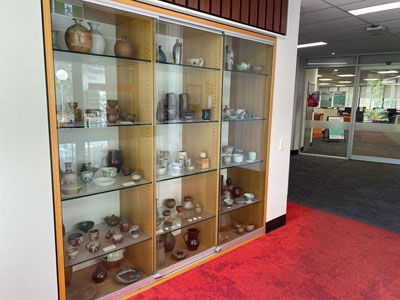
The McConnell Gift of Studio Pottery
Dr Carl and Phillip McConnell and various others
Ceramics (approx. 250 works), pottery
Griffith University Art Collection
The McConnell Gift
In 2005 Phillip and Barbara McConnell gifted a significant collection of more than 200 ceramics held by the family to Griffith University in memory of Phillip’s father, Dr Carl McConnell AO.
Carl McConnell is regarded as one of the most significant potters in Brisbane in the latter 20th Century with Phillip later gaining an equal reputation. Born in Chicago, USA, Carl studied art there, in Dallas and in Mephis before serving in the US Navy in the Second World War. During his service he was posted for some time in Brisbane and returned in 1948 with his Australian wife and son Phillip, then 2 years old. His interest in ceramics formed at the Central Technical College (precursor to the Queensland College of Art and Design), where he later taught between 1958 – 1963 and again in 1971 – 1974. He ceased practice as a potter in 1983.
Born in Burbank, California (and hence still a US citizen), Phillip also served two years in the US Navy as a conscript, an unexpected result of a 1968 surfing holiday to Hawaii. He had already trained with his father at their Pinjarra Hills pottery and commenced a short stint of studies at the Central Technical College before taking a formal apprenticeship. After a solo exhibition in 1970 Phillip was invited to Japan to work in Tatsuzo Shimoaka’s Mashiko pottery and latter with the Fujiwara family at Imbe, Bizen.
The McConnel Gift comprises of their own work and example works by other potters, including prized reference pieces from Japan embodying the influence of Bernard Leach on later 20th Century studio pottery, as well as work by Leach himself, apprentices at the pottery and other peers. The gift is particularly significant in the insight it gives to the interests, explorations and appreciations of the collectors.
The McConnel Gift is augmented by other McConnel works from another significant gift of ceramics to the University donated in 2012 by Glenn R. Cooke, previously Curator of Decorative Arts and late Curator Queensland Heritage at the Queensland Art Gallery. Also included are works contributed by the collection of the Central Technical College acquired by the University through amalgamation with the Queensland College of Art and Design in 1991-92.
Studio Pottery
This display of the McConnell Gift and related works provides a unique view of the influence of the studio pottery movement initiated in St Ives in Cornwall, UK, by Bernard Leach in the early 20th Century. Born in Hong Kong and later raised in Japan, Leach studied in London (Slade School of Fine Art and London School of Art) before returning to Tokyo in 1909 to teach etching, where he became acquainted with and studied Japanese ceramics.
There are distinct styles in Japanese ceramics influenced variously by Chinese and Korean traditions. As one of the country’s oldest idioms of cultural expression they provide important identifying references. There are both highly finished glazed porcelain practice and celadon-ware ultilising elements of Indian-Chinese Buddhist symbolism like the lotus motif as well as the more “utilitarian” unglazed earthenware and stoneware approaches epitomising Korean origins through simple practical forms evoking a more “rural” influence.
Favouring this second style over more sophisticated Chinese porcelain elided with the rise of Zen Buddhism in the 16th Century with considerations of the aesthetic principle of wabi-sabi (embodying acceptance of transience and imperfection in the motif of “austerity and patina”) entering the etiquette of the highly formalised traditional tea ceremony.
The character of the vessels and utensils laid out by the host figures the seasonal and aesthetic theming of each event and provides focus for specific comment in the set conversational engagements of the ceremony. Variations in glaze, the effects of firing, happy accidents in form and finish and the shadow of the hand of the maker all related to the traditions of establish kilns in ancient centres contributing to the expression of the vessel as an object of contemplation and comment making them worthy attributes for appreciation.
Written after his return to the UK in the 1920s, Leach’s highly influential work A Potter’s Book 1940 exploring the language of Korean and Japanese workshop traditions, is credited with encouraging and providing guidance for the diverse experimentation by artisan potters evident in the nature of later 20th Century studio practice, including that of the McConnells here in Brisbane.